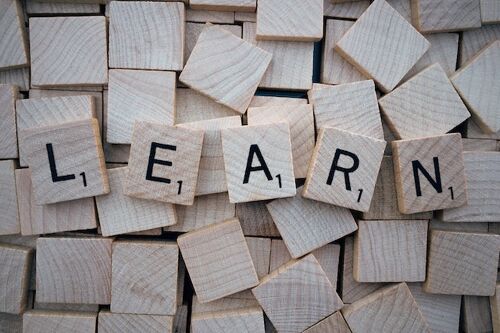The Role of Continuous Education in Career Advancement (Guest)
Embracing continuous education in career advancement is key to maintaining relevance.

https://www.pexels.com/photo/letter-blocks-247819/
In today's rapidly evolving workplace landscape, professionals are finding it imperative to remain adaptable and forward-thinking. With the changing pace of industries and technologies, staying updated is not just a matter of choice but a critical necessity. One of the most potent tools to maintain relevance and improve resilience in this dynamic environment is embracing continuous education in career advancement. This proactive approach ensures you remain on top of industry trends and fortifies your position in an ever-competitive job market.
The Changing Face of the Modern Workplace
Historically, job requirements were relatively static, demanding consistent skills over extended periods. Contrast that with today, where technological innovations and shifts in industry practices seem almost daily occurrences. Furthermore, globalisation has dissolved borders, making workplaces more interconnected. Consequently, professionals must compete globally, necessitating a broader, more up-to-date skill set. To navigate this new world of work, understanding and adapting to these changes becomes paramount for anyone aiming for longevity and success in their career.
The Direct Link: Continuous Education and Climbing the Career Ladder
Continuous education in your profession isn't merely about acquiring new knowledge. It's about enhancing one's value in a saturated job market. By consistently updating one's skillset, an individual becomes a more versatile employee and gains an edge in negotiations, whether for a job interview, a promotion, or a raise. For example, consider a marketing professional. By taking additional courses in digital marketing trends and data analytics, one could pivot from a traditional marketing role to leading the company's online campaigns, resulting in a significant salary bump and a broader scope of responsibilities.
Moreover, integrating continuous education in career advancement has become one of the most effective career development strategies. When mapping out growth areas and aligning them with industry needs, professionals can anticipate market demands, positioning themselves as indispensable assets. It's a proactive approach, which, when combined with traditional career strategies, offers a more holistic path to achieving one's professional aspirations. In essence, continuous education is the bridge that can help professionals move from where they are to where they aspire to be, making it a pivotal strategy in today's career landscape.
Top Benefits of Continuous Education
Continuous education offers myriad benefits that can reshape an individual’s career trajectory. Whether you’re looking to upskill, switch professions, or remain updated, investing in continuous learning can provide tangible advantages in the professional realm.
Enhanced Skill Set
The primary objective of continuous education is to diversify and upgrade one’s abilities. That refers to technical and soft skills like communication, leadership, and problem-solving. By mastering both, an individual ensures they remain relevant and a step ahead in their domain.
Increased Confidence
With knowledge comes confidence. When you’re well-versed in your industry's latest trends and tools, you approach tasks with greater assurance. This heightened self-assuredness can be a game-changer, especially when you want to nail your next interview. Being prepared in terms of qualifications and with the latest insights and methodologies in your field makes you a standout candidate, increasing your chances of landing that coveted position.
Networking Opportunities
Engaging in courses, seminars, and workshops doesn’t just provide educational value; it also opens doors to networking. Interacting with peers, industry leaders, and educators can lead to collaborative opportunities, mentorships, or job offers. Every class or seminar is a chance to expand your professional circle and potential career avenues.
Higher Earning Potential
Perhaps one of the most tangible benefits of continuous education is the potential for increased earnings. By equipping oneself with the latest skills and knowledge, an individual becomes a more valuable asset to employers. That improves job prospects and strengthens one's negotiating position when discussing salaries or raises. In a rapidly evolving job market, the ROI of continuous education can be significant, offering professionals a clear monetary advantage.
As you can see, continuous education is more than just amassing certificates or attending classes. It's an investment in one's future. Whether it's about mastering a new tool or building connections, continuous learning lays the groundwork for a promising and progressive career.
Practical Ways to Incorporate Continuous Learning
In our digital era, integrating continuous learning into one's routine has become vital and vastly more accessible. Here are some concise strategies to harness ongoing education effectively:
Online Courses and Certifications
Various online platforms offer courses ranging from short skill-focused modules to comprehensive certifications. Their flexibility and global expert-led courses make them a top choice for many professionals.
Workshops, Seminars, and Conferences
In-person learning experiences, like workshops and conferences, provide a dual benefit: gaining hands-on knowledge and networking. These events are essential for staying updated with industry trends and creating valuable connections.
Peer Learning, Mentorship, and Coaching Programmes
Engaging with colleagues, sharing experiences, or establishing mentor-mentee relationships can offer rich insights. Coaching programmes tailored to individual needs provide focused guidance, aligning learning objectives with career aspirations and offering actionable feedback.
Reading: Industry Journals and Books
Regular reading, whether industry journals or broader non-fiction books, keeps one informed and sharpens cognitive skills. Dedicate time to this traditional yet invaluable learning method.
Ultimately, continuous learning doesn't require drastic overhauls in one's routine. By leveraging available resources and aligning them with career goals, professionals can efficiently integrate learning into their daily life.
Challenges and Solutions in Pursuing Continuous Education in Career Advancement
While continuous education offers undeniable benefits, it comes with challenges. Let's explore these hurdles and the solutions to navigate them effectively.
Time Constraints
Challenge: With personal and professional commitments, finding time for additional learning can seem overwhelming.
Solution: Prioritize learning objectives and break them down into manageable chunks. Opt for microlearning sessions or schedule dedicated weekly hours to ensure consistency.
Financial Concerns
Challenge: Some educational avenues, especially formal certifications, can be expensive.
Solution: Explore free online resources, scholarships, or employer-sponsored learning programs. Platforms like edX and Coursera also offer financial assistance for eligible learners.
Staying Motivated
Challenge: Maintaining the drive for continuous learning can be daunting, especially when results aren't immediate.
Solution: Set clear, achievable goals. Track your progress and celebrate small victories. Joining learning groups or communities can also motivate through shared experiences.
Tailoring Continuous Education for Optimal Career Advancement
The true power of continuous education lies in its strategic alignment with one's career aspirations. First, it's vital to identify personal and industry skill gaps. This introspection helps target specific areas that need development, ensuring that the time and resources spent yield maximum career returns.
Next, setting short-term and long-term learning objectives provides a roadmap to navigate the educational journey. Short-term objectives might involve mastering a particular tool or technique, while long-term ones could be oriented toward deeper expertise or a significant career shift.
Lastly, it's essential to prioritise areas of learning based on their career return potential. While it might be tempting to delve into every available course or workshop, focusing on areas that directly enhance professional value or open new career opportunities is more effective.
Conclusion
Continuous education in career advancement is no longer a luxury—it's a necessity. In the fast-paced, ever-evolving professional landscape, the commitment to continuous learning remains a distinguishing factor between mere survival and thriving success. By understanding its significance, facing the challenges head-on, and strategically aligning learning with career aspirations, professionals can unlock unparalleled growth opportunities, ensuring job security and a fulfilling and prosperous career journey.
How are you going to maintain your career relevance?














